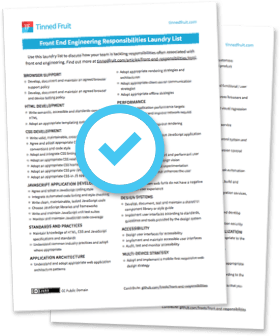What do you do, exactly?
Jabe Bloom tweets:
In org design most everyone only has a role “in”… so few “between”
Boundary Spanning roles (often left to management) are critical… and far too often “replaced” by brittle policy…
At first I assumed that this was the start of a long thread. Alas, any further conclusions are left to the imagination of the reader (and to be fair, the repliers, from which the title of this post is shamelessly stolen).
I’m no expert in organisation design, but this did get me thinking about cross-functional product teams.
My wife and I have a long-running joke that she doesn’t really know what I do for a job, like Chandler from Friends. To be fair, it’s changed a lot over the years.
Ten years ago, if I was asked “What do you do, exactly?”, my answer could quite simply be “I am a web developer for [org] working on [project].”
Even within a larger organisation with many products, projects and teams, our working identity is tied very tightly with the team that we are in. “I’m a front-end developer working on the login and registration team.”
I worked in one large company where there were very strong boundaries between project teams. Collaboration rarely occurred as internal team autonomy was highly valued. We had complete control over almost everything we did. But this also meant that we missed opportunities to learn from other teams, to make use of common tooling or platform capabilities, and to foster an identity outside the scope of the team.
These days, the popularity of matrix management and Spotify-style approaches to org design in tech mean that cross-team collaboration is also encouraged. It’s now possible to maintain separate, overlapping identities within a single organisation: Lead Developer on Growth Squad, Front End Chapter lead, Knitting Club social secretary, Kubernetes Interest Group co-organiser. And all of these can be independent of someone’s seniority, salary and position in the org chart.
Social status is a complex thing. And it has increasingly little to do with job titles, remuneration or LinkedIn connection counts.
So when someone asks you “What do you do, exactly?” how do you answer?. Hit reply and let me know.
All the best,
– Jim
